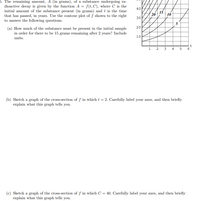
Calculus: Early Transcendentals
8th Edition
ISBN: 9781285741550
Author: James Stewart
Publisher: Cengage Learning
expand_more
expand_more
format_list_bulleted
Question

Transcribed Image Text:5. The remaining amount, A (in grams), of a substance undergoing ra-
dioactive decay is given by the function A = f(t,C), where C is the
initial amount of the substance present (in grams) and t is the time
that has passed, in years. Use the contour plot of f shown to the right
to answer the following questions.
40
15
20
10
30
20
(a) How much of the substance must be present in the initial sample
in order for there to be 15 grams remaining after 2 years? Include
10
units.
1
2
3
4
6
(b) Sketch a graph of the cross-section of f in which t = 2. Carefully label your axes, and then briefly
explain what this graph tells you.
(c) Sketch a graph of the cross-section of f in which C = 40. Carefully label your axes, and then briefly
explain what this graph tells you.
Expert Solution
This question has been solved!
Explore an expertly crafted, step-by-step solution for a thorough understanding of key concepts.
This is a popular solution
Trending nowThis is a popular solution!
Step by stepSolved in 3 steps with 3 images

Knowledge Booster
Similar questions
- 2. An investment of $100 is placed into an account that earns interest, compounded annually, at a rate of 5% for 7 years. The amount, A, in the account can be modelled by the function A = 100(1.05)', where t is the time, in years. What is the domain of this function? a. (t e R, 2 7} b. (t e R, 0 SIS7) c. (te R, t > 7} d. (t e R,0arrow_forward- GROWTH OF TABLET AND SMARTPHONE USERS The number of tablets and smartphones in use worldwide (in millions) in year t from 2010 through 2012 can be approximated by f(t) = 128.111.94 (1Si 3) %3D where t = 1 corresponds to 2010. a. How many tablets and smartphones were in use in 2011? b. How fast was the number of tablets and smartphones changing in 2011?arrow_forwardRadium (Ra-225) has a half-life of 15 days. For a 100 g sample, the amount of radioactive material remaining, A, after time t, is given by the equation A(t) = 100(0.5) is, where A is measured in grams and t is measured in days. a. Find the average rate of change from 3 days to 4 days, rounded to one decimal place. b. Approximate the average rate of change at t = 3 days, rounded to one decimal place.arrow_forward
Recommended textbooks for you
 Calculus: Early TranscendentalsCalculusISBN:9781285741550Author:James StewartPublisher:Cengage Learning
Calculus: Early TranscendentalsCalculusISBN:9781285741550Author:James StewartPublisher:Cengage Learning Thomas' Calculus (14th Edition)CalculusISBN:9780134438986Author:Joel R. Hass, Christopher E. Heil, Maurice D. WeirPublisher:PEARSON
Thomas' Calculus (14th Edition)CalculusISBN:9780134438986Author:Joel R. Hass, Christopher E. Heil, Maurice D. WeirPublisher:PEARSON Calculus: Early Transcendentals (3rd Edition)CalculusISBN:9780134763644Author:William L. Briggs, Lyle Cochran, Bernard Gillett, Eric SchulzPublisher:PEARSON
Calculus: Early Transcendentals (3rd Edition)CalculusISBN:9780134763644Author:William L. Briggs, Lyle Cochran, Bernard Gillett, Eric SchulzPublisher:PEARSON Calculus: Early TranscendentalsCalculusISBN:9781319050740Author:Jon Rogawski, Colin Adams, Robert FranzosaPublisher:W. H. Freeman
Calculus: Early TranscendentalsCalculusISBN:9781319050740Author:Jon Rogawski, Colin Adams, Robert FranzosaPublisher:W. H. Freeman
 Calculus: Early Transcendental FunctionsCalculusISBN:9781337552516Author:Ron Larson, Bruce H. EdwardsPublisher:Cengage Learning
Calculus: Early Transcendental FunctionsCalculusISBN:9781337552516Author:Ron Larson, Bruce H. EdwardsPublisher:Cengage Learning

Calculus: Early Transcendentals
Calculus
ISBN:9781285741550
Author:James Stewart
Publisher:Cengage Learning

Thomas' Calculus (14th Edition)
Calculus
ISBN:9780134438986
Author:Joel R. Hass, Christopher E. Heil, Maurice D. Weir
Publisher:PEARSON

Calculus: Early Transcendentals (3rd Edition)
Calculus
ISBN:9780134763644
Author:William L. Briggs, Lyle Cochran, Bernard Gillett, Eric Schulz
Publisher:PEARSON

Calculus: Early Transcendentals
Calculus
ISBN:9781319050740
Author:Jon Rogawski, Colin Adams, Robert Franzosa
Publisher:W. H. Freeman


Calculus: Early Transcendental Functions
Calculus
ISBN:9781337552516
Author:Ron Larson, Bruce H. Edwards
Publisher:Cengage Learning